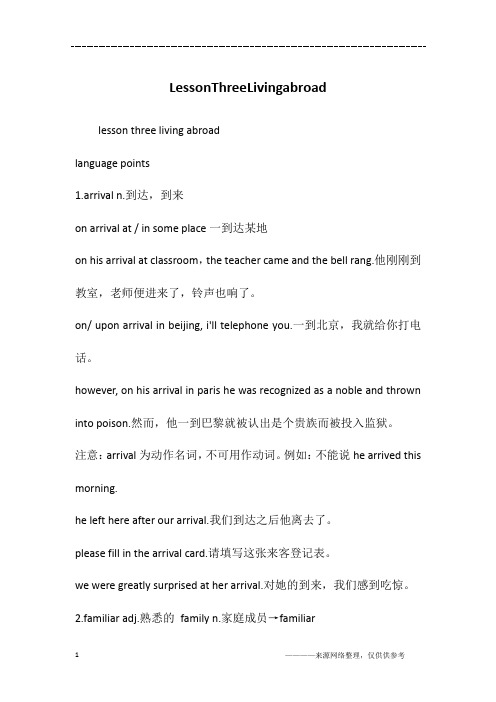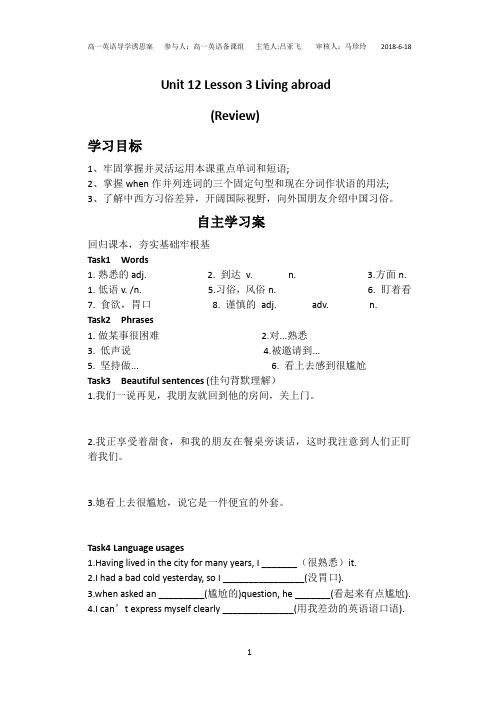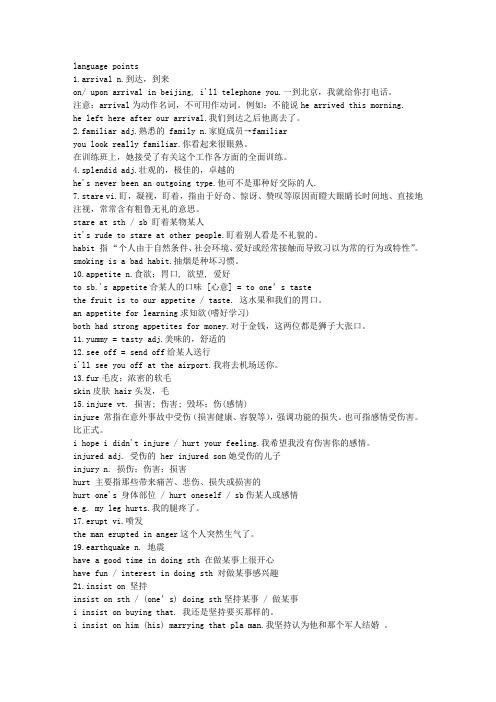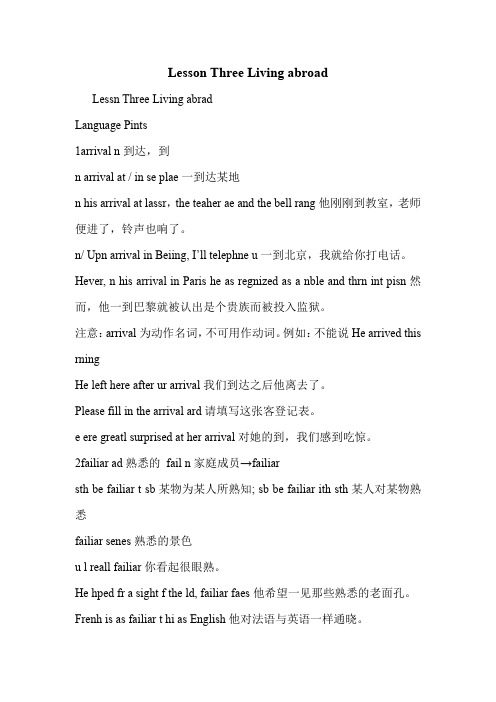Lesson 3 Living Abroad
高二英语 Unit 12 Lesson 3 Living Abroad课件 北师大必修4

6. Friendly, welcoming, and generous to visitors. ( hospitable )
7. Extremely good especially in an unexpected way. ( amazing )
( T ) 2. Tom couldn’t understand why his friend’s grandfather wanted to go with him to the bus station.
( NI ) 3. Tina was a friend of the tourist guide.
8. Feeling shy and uneasy. ( ) embarrassed
Voice your opinion
What do you think are most important to you if you have a chance to visit a city for the first time, its place, its food or its architecture?
Lesson 3 Living Abroad
Teaching aims:
• To learn different cultures between China and America, cultivating students’ cultural awareness. • To learn to express their opinions in English, developing students’ oral ability. • To practice using Present Participle.
Lesson 3 Living Abroad 在国外生活

在国外生活
Objectives:
By the end of this lesson ,you’ll be able to: 1 learn different cultures between China and America. 2 guess the meanings of the new words in the context. 3 express opinions in English ,developing oral ability.
Rules for being polite in America
Situations
say goodbye, go back to the room, close the door
whisper to each other not give more food if the guest doesn’t ask for more Feel happy, say thanks
1. liking to meet and talk to new people (outgoing Wang Lei) appetite 2. a desire for food (Martin) 3. speak very quietly (Wang Lei) whisper 4. part (Jin Li) aspect 5. careful (Wang Lei) cautious 6. tasty (Martin) yummy 美味的 7. Excellent (Jin Li) 8. look at something for a long time without moving your eyes (Wang Lei)
LessonThreeLivingabroad

LessonThreeLivingabroadlesson three living abroadlanguage points1.arrival n.到达,到来on arrival at / in some place一到达某地on his arrival at classroom,the teacher came and the bell rang.他刚刚到教室,老师便进来了,铃声也响了。
on/ upon arrival in beijing, i'll telephone you.一到北京,我就给你打电话。
however, on his arrival in paris he was recognized as a noble and thrown into poison.然而,他一到巴黎就被认出是个贵族而被投入监狱。
注意:arrival为动作名词,不可用作动词。
例如:不能说he arrived this morning.he left here after our arrival.我们到达之后他离去了。
please fill in the arrival card.请填写这张来客登记表。
we were greatly surprised at her arrival.对她的到来,我们感到吃惊。
2.familiar adj.熟悉的family n.家庭成员→familiarsth be familiar to sb某物为某人所熟知; sb be familiar with sth某人对某物熟悉familiar scenes熟悉的景色you look really familiar.你看起来很眼熟。
he hoped for a sight of the old, familiar faces.他希望一见那些熟悉的老面孔。
french is as familiar to him as english.他对法语与英语一样通晓。
Lesson3LivingAbroad

Unit 12 Lesson 3 Living abroad(Review)学习目标1、牢固掌握并灵活运用本课重点单词和短语;2、掌握when作并列连词的三个固定句型和现在分词作状语的用法;3、了解中西方习俗差异,开阔国际视野,向外国朋友介绍中国习俗。
自主学习案回归课本,夯实基础牢根基Task1 Words1.熟悉的adj.2. 到达v. n.3.方面n.1.低语v. /n. 5.习俗,风俗n. 6. 盯着看7. 食欲,胃口8. 谨慎的adj. adv. n.Task2 Phrases1.做某事很困难2.对...熟悉3. 低声说4.被邀请到...5. 坚持做...6. 看上去感到很尴尬Task3 Beautiful sentences (佳句背默理解)1.我们一说再见,我朋友就回到他的房间,关上门。
2.我正享受着甜食,和我的朋友在餐桌旁谈话,这时我注意到人们正盯着我们。
3.她看上去很尴尬,说它是一件便宜的外套。
Task4 Language usages1.Having lived in the city for many years, I _______(很熟悉)it.2.I had a bad cold yesterday, so I ________________(没胃口).3.when asked an _________(尴尬的)question, he _______(看起来有点尴尬).4.I can’t express myself clearly ______________(用我差劲的英语语口语).探究案Task1 句型自探-----独立思考现潜能1.We were about to lock the door _________the phone rang.2.I __________(enjoy) my dessert and talking to my American friendJanice at the table when I noticed people staring at us.3.He had just finished his homework ______ his mother asked him to practise playing the piano.4.They were driving home very late at night while a heavy storm broke out.(改错)总结:When 作并列连词,意思是_______________, 常用在下面固定句型1)______________________________________翻译为:__________________________ 2)______________________________________翻译为:__________________________ 3)______________________________________翻译为:__________________________Task2语法同桌互探-----两人智慧胜一人1.I stayed up the whole night, ________(prepare) for a speech.2.Everyone was silent, wait to see who would be called. (2018高考卷短文改错)3.___________(approach) the vehicle, they saw that a woman was trying to get out of the window. (2016全国卷1 第51小题)4.______________(give) more time, we would have finished it better.5.When I turned around , I noticed a stranger staring at me.= _____________ around , I noticed a stranger staring at me.总结:分词(非谓语)作状语:第一步先判定是否是分词作状语,句子后无并列连词and/but+非谓语如句1,句2;或非谓语逗号句子,如句3,句4。
LESSON THREE LIVING ABROAD

language points1.arrival n.到达,到来on/ upon arrival in beijing, i'll telephone you.一到北京,我就给你打电话。
注意:arrival为动作名词,不可用作动词。
例如:不能说he arrived this morning.he left here after our arrival.我们到达之后他离去了。
2.familiar adj.熟悉的 family n.家庭成员→familiaryou look really familiar.你看起来很眼熟。
在训练班上,她接受了有关这个工作各方面的全面训练。
4.splendid adj.壮观的,极佳的,卓越的he's never been an outgoing type.他可不是那种好交际的人.7.stare vi.盯,凝视,盯着,指由于好奇、惊讶、赞叹等原因而瞪大眼睛长时间地、直接地注视,常常含有粗鲁无礼的意思。
stare at sth / sb 盯着某物某人it's rude to stare at other people.盯着别人看是不礼貌的。
habit 指“个人由于自然条件、社会环境、爱好或经常接触而导致习以为常的行为或特性”。
smoking is a bad habit.抽烟是种坏习惯。
10.appetite n.食欲;胃口, 欲望, 爱好to sb.'s appetite合某人的口味 [心意] = to one’s tastethe fruit is to our appetite / taste. 这水果和我们的胃口。
an appetite for learning求知欲(嗜好学习)both had strong appetites for money.对于金钱,这两位都是狮子大张口。
11.yummy = tasty adj.美味的,舒适的12.see off = send off给某人送行i'll see you off at the airport.我将去机场送你。
Lesson Three Living abroad

Lesson Three Living abroadLessn Three Living abradLanguage Pints1arrival n到达,到n arrival at / in se plae一到达某地n his arrival at lassr,the teaher ae and the bell rang他刚刚到教室,老师便进了,铃声也响了。
n/ Upn arrival in Beiing, I’ll telephne u一到北京,我就给你打电话。
Hever, n his arrival in Paris he as regnized as a nble and thrn int pisn然而,他一到巴黎就被认出是个贵族而被投入监狱。
注意:arrival为动作名词,不可用作动词。
例如:不能说He arrived this rningHe left here after ur arrival我们到达之后他离去了。
Please fill in the arrival ard请填写这张客登记表。
e ere greatl surprised at her arrival对她的到,我们感到吃惊。
2failiar ad熟悉的fail n家庭成员→failiarsth be failiar t sb某物为某人所熟知; sb be failiar ith sth某人对某物熟悉failiar senes熟悉的景色u l reall failiar你看起很眼熟。
He hped fr a sight f the ld, failiar faes他希望一见那些熟悉的老面孔。
Frenh is as failiar t hi as English他对法语与英语一样通晓。
His handriting is as failiar t u as ur n你对他的书法也了如指掌。
The part ended up ith a sng that everne is failiar ith晚会以大家都熟悉的一首歌曲结束。
高一英语 Unit12 Lesson3 Living Abroad课件 北师大必修模块4

grandfather wanted to go with him to the bus station. 6. Tina was a friend of the tourist guide.
Match the five persons with their feelings
(1) Jin Li
A felt amazed that his friend’s grandfather insisted on walking him to the station
(2) Wang Lei B felt that Chinese are welcoming because he still got more food even by saying “No, thank you”.
Skim the passage to check your answer.
Predict :
Did they have difficulty understanding the American or Chinese ways of doing things? Yes .
So it’s nessary to know about cultures before living abroad.
6. Tina was a friend of the tourist guide. NI
vocabulary
• 1. liking to meet and talk to new people outgoing
Unit12lesson3《LivingAbroad》课件(24张ppt)北师大版必修四

God Freedom
New York
USA
Tea culture
Paper-cutting
Lion dance
drums Dragon boat
Lantern &
Qipao
Lucky knots
Folk art: tiger head shoes
Please read the two dialogues and answer the following question:
receive the same kind of thing from
them.
( exchange)
2. A desire for food.
( appetite)
3. People who have guests. ( host )
4. A place where you can buy and eat a meal. ( restaurant)
Lesson 3 Living Abroad
Teaching aims:
• To learn different cultures between China and America, cultivating students’ cultural awareness. • To learn to express their opinions in English, developing students’ oral ability. • To practice using Present Participle.
8. Feeling shy and uneasy. ( embarrassed)
Voice your opinion
高一英语 Unit12 Lesson3 Living Abroad课件 北师大版必修模块4 精品

3 express opinions in English ,developing oral ability.
Warm up
What is China most famous for?
Bird’s Nest
Lesson 3 Living Abroad
Lesson 3 Living abroad
Objectives:
By the end of this lesson ,you’ll be able to:
1 learn different cultures between China and America.
4. Martin stayed in China with a local family. NI
5. Tom couldn’t understand why his friend’s grandfather wanted to go with him to the bus station. T
6. Tina was a friend of the tourist guide. NI
Match the five persons with their feelings
(1) Jin Li (2) Wang Lei
A felt amazed that his friend’s grandfather insisted on walking him to the station
B felt that Chinese are welcoming because he still got more food even by saying “No, thank you”.
- 1、下载文档前请自行甄别文档内容的完整性,平台不提供额外的编辑、内容补充、找答案等附加服务。
- 2、"仅部分预览"的文档,不可在线预览部分如存在完整性等问题,可反馈申请退款(可完整预览的文档不适用该条件!)。
- 3、如文档侵犯您的权益,请联系客服反馈,我们会尽快为您处理(人工客服工作时间:9:00-18:30)。
1. liking to meet and talk to new people outgoing 2. a desire for food appetite 3. speak very quietly whisper 4. part aspect 5. careful
6. tasty 7. excபைடு நூலகம்llent
C. It is formal What about American or Britain?
2. When you are in a restaurant with a friend you ________. B A. can talk aloud
B. can’t talk aloud because it is not good
sentences are true, false or with no
information provided.
1. Jin Li found the American way of life familiar soon after her arrival in the NI USA. 2. We know Jin Li has at least one T American friend. 3. Wang Lei never went back to the restaurant in New York again. NI
What do you think is the most interesting to you when you visit a city for the first time, its people, its food or its architecture?
Find the words in the texts which mean the following.
In fact, different countries or even different areas have different customs. In order to avoid getting confused, we must learn more about the other countries. And do as the
aspect, side, angle这些名词均有“方 面”之意。 aspect: 着重以特定观点对事物进行观 察或考虑。 side: 可与aspect和phase换用,但更着 重构成事物全貌的一个或多个方面。 angle: 专指从某一角度去观察、考虑 事物的某个方面。
2. have a difficult time (in) doing sth. 做…有困难 When I first arrived in San Francisco, I had a difficult time understanding certain aspects of the American way doing things. The child had a difficult time in finding his way home. I had a difficult time in solving these problems.
4. Martin stayed in China with a local
family.
F
5. Tom couldn’t understand why his
friend’s grandfather wanted to go
T
with him to the bus station. 6. Tina was a friend of the tourist guide. NI
these following customs in china
and western countries.
1. When you leave a friend’s home, he close the door behind you. C
A. You feel you are not welcome. B. He is impolite
time in another country? What did they
find that was similar to or different from
our country?
Listen and learn the new vocabulary.
Read the text and decide if these
1. In China perhaps one of the things that surprises a Western visitor most is that some of the Chinese hosts like to put food into the plates of their guests. In formal dinners, there are always “public” chopsticks and spoons for this purpose, but some hosts may use their own chopsticks.
D. No, it’s not so good
What about American or Britain?
Language Points
1. When I first arrived in San Francisco, I had a difficult time understanding certain aspects of he American way of doing things. aspect n. 方面,外貌,外观; 观点 I am a beginner in this aspect. The most terrifying aspect of nuclear bombing is radiation. she received a thorough training in every aspect of the job. The fierce aspect of the salesman frightened the customer off.
Culture Shock
Lesson 3
Have you ever been abroad? What do you think of your life abroad?
What do you think China is famous for? What about the U.S.A?
culture in China and the U.S.A.
Match the five persons with their feelings of culture shock.
(1) Jin Li (2) Wang Lei (3) Martin
(4) Tom
(5) Tina
A felt amazed that his friend’s grandfather insisted on walking him to the station. B felt that Chinese are welcoming from a fact that he still got more food even by saying “No, thank you”. C felt that Chinese are modest and not used to accepting compliments(恭维话)when they are praised face to face. D felt that he wasn’t welcome after his American friend closed the door as soon as they said goodbye. E felt embarrassed because she talked loudly
manners
C. must talk aloud to make others listen carefully
What about American or Britain?
3. When you invite guests to dinner you will ________. A
A. say to him “help yourself” B. Keep on putting more food in his bowl C. will give your guests more food to show your welcome. What about American or Britain?
2. It is always polite to eat the food. If you do not eat it, just leave the food in the plate. People in China tend to over-order food, for they will find it embarrassing if all the food is consumed. When you have had enough, just say so, or you will always overeat!
cautious yummy splendid
8. look at something for a long time without moving your eyes stare
The customs are different in different countries. Now compare
Romans do.
What would you learn by working or studying in a foreign country?
How difficult do you think it is to adjust to
